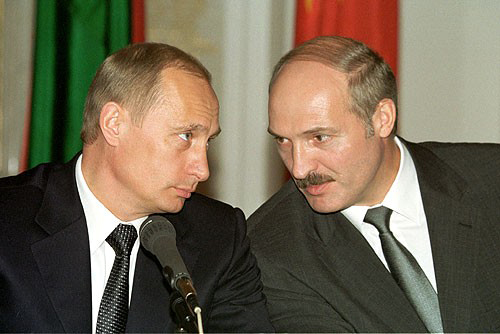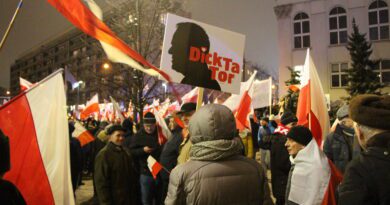How Putin and Lukashenko are playing the EU

Russia is once again profiting from its own game. It created an aggressive conflict, and then managed to play the role of a partner of the West concerned about the stability of the continent.
Piotr Semka
A day before this year’s anniversary of the fall of the Berlin Wall, Angela Merkel gave an interview to Deutsche Welle. Summarizing her tenure in office, she stated that her declaration of, “We will prevail” from 2015 can be considered fulfilled. Merkel stated, “Yes, we did it”. At the same time, she confirmed that the Federal Republic of Germany is still wrestling with the problem of migrants. “We must do significantly more with developmental aid, with legal migration. Human traffickers still have an advantage over us”.
Four days later the German Chancellor made her first phone call to the most influential human trafficker in Europe – Alexander Lukashenko. A politician, whose election for the presidency of Belarus was not recognized by the European Union for a year. A man, who with the help of Russia hand in hand with touts from Middle Eastern countries used refugees as a weapon in a new version of a hybrid war against the West. Now we have completed two conversations with the Belarusian dictator. An expert commission comprising of EU representatives and Lukashenko has been formed. Ursula von der Leyen declared that financial aid will be provided to keep the refugees in Belarus.
The migration blackmail proved to be effective and the recommendation of Vladimir Putin to have the EU talk with Lukashenko has been broughtto life. A crowd of immigrants gathered around the territory of the Kuźnica-Bruzgi border crossing reacted vivaciously to news of the commencement of negotiations between the EU and the Belarusian authorities. They too were entitled to adopt the position that exerting pressure on European borders is profitable.
A CARD GAME WITH A WEAK HAND
In order to determine who achieved their goals in the game, we should first analyze who had what goals. Lukashenko, in starting the “Sluice” operation, acted from a motive of ambition. He was hungry for revenge against the West and Poland for their support of the opposition during the Belarusian presidential elections in 2020. These emotions are well reflected in the tirade of Grigoriy Azarenok, a principal propagandist in the regime of the Belarusian state TV. Lukashenko’s favorite attempted to put the West in a state of fear with the following words: “You’re risking unheated flats and cutting-off of heating gas for many large companies. Your talk of how raw materials such as gas are essential for the functioning of your economies does not move us. You did not hesitate to impose sanctions on a nation of 10 million in the center of Europe, did not hesitate to send saboteurs and terrorists, did not hesitate to humiliate and insult the country led by the winner of the elections and its leader. You were not afraid to condemn a few thousand people deceived by you to death from hunger and cold. […] Small but proud Belarus split you open like a nut. Now everything will be dictated on the terms of and according to Lukashenko’s will.
Lukashenko wanted to take revenge on Brussels and simultaneously break Belarus away from the loop of EU sanctions and diplomatic isolation. Vladimir Putin, on the other hand, had significantly bigger hopes for the “Sluice” operation. For him, the quarrel at the Polish-Belarusian border was another opportunity to test how far the Western camp can divide itself. At the same time, the Kremlin has a tradition of creating a series of conflicts and following their conception take on the part of the good uncle. A mediator, who is assisting in the resolution of problems in exchange for various concessions of the West. This is why Putin started to concentrate his military forces on Russia’s border with Ukraine. Naturally, somewhere in the background there was the typical eagerness to embarrass Poland by the Russians as the Slav traitor, who entered into a pact with the West. It is highly possible that Putin also wants to use the option of an amicable resolution to this conflict in order to obtain guarantees for the future of the Nord Stream 2 pipeline.
In this sense three phone calls from Merkel to Lukashenko and one to Putin, strengthened by Emanuel Macron’s phone conversation with the Kremlin ruler were a classic example of the effectiveness of blackmail. Russian analysts rightly foresaw that the West will not go in the direction of using force to strengthen the Belarusian border with Poland, Lithuania, and Latvia, but will look for some attempt to solve the problem, throwing money and participating in accepting at least some of the refugees. Today, all of these Belarusian advisors circling around the crowd of travelers from the Middle East can communicate to their Arabic protegees that the advice to expose women and children in front of cameras was successful. Perhaps the only unpleasantness was the disappointment that Poland stood up against this blackmail with a relatively high resistance to pressure and aggression. If the opinions expressed in the elite program of Vladimir Soloviev, an analyst close to Putin, were considered authoritative from the Kremlin’s view, the only surprise for Russia was the strength of Poland’s determination. It was assumed, however, that the pressure of Brussels and the internal front of the opposition, intellectuals, and artists calling for “acceptance of all”, would prove to be more effective.
But the prediction of the attitude of the West already proved to be accurate. The European Commission denied co-financing of the wall on the border with Belarus. A large portion of the Western media adopted the logic of two enemies i.e., refugees as the victims of both Lukashenko’s and Poland’s cruelness. The presentation of the conflict by the Al-Jazeera Arabic network was quite distinguishing in particular, where the clash in the Kuźnica crossing was reported as an attack by the Polish police on refugees with the use of watering cans, ignoring the fact that it was a response to an attack with rocks.
The most important thing for the Russians is that once again they were able to bring attention to the dysfunctions of the European Union. Angela Merkel began making phone calls to Moscow and Minsk without any formal mandate from EU leaders. What was already clear to many observers came to light – Ursula van der Leyen was and is Angela Merkel’s puppet. One of the Baltic diplomats accurately commented on this matter with some bitterness: “There was so much talk about European diplomacy, and at a crucial moment all of it turned out to be only a masquerade.”
The embittered diplomat is of course right. Once again, it turned out that the entire EU structure was a glittering decoration for the domination of Berlin and partly Paris.
(…)
ON MURKY WATERS
Angela Merkel eventually called Prime Minister Morawiecki and promised to coordinate the actions in the direction of resolving the conflict with Warsaw. The meeting in Warsaw between the German Minister of Internal Affairs, Horst Seehofer, and Mariusz Kamiński1 served the same purpose. Although it will be difficult to reconcile dialogue focused on such personal interactions of the German Chancellor with Putin and Lukashenko with some sort of joint diplomacy. If Merkel were to treat EU politics seriously, she would organize a meeting at least solely with the countries bordering Belarus before opting to make her phone calls.
It will be a difficult test for the government in Warsaw. Until the government of the Law and Justice party defended the border – the matter was quite obvious. Now it will stand before a choice. Either to accept the settlement prepared by Angela Merkel and Ursula von der Leyen or to turn its back. It will not be easy for Morawiecki, since he is already juggling plenty of conflicts with the EU. And if the West fills the conflict with money and deescalates the refugee conflict in Belarus – either by taking some of them in or by sending them back to their countries – Poland will be able to conclude that the minimal plan has been completed. The travelers from Iraq or Syria had to forego their intention to march through Poland to get to their German dreamland with complete disregard for the sovereignty of our nation. As it can be inferred, either the camps for the refugees will be built on Belarusian territory by significant EU spending, or some neutral ground will be chosen for the immigrants, such as Moldavia for example. The emissaries from Berlin attempted to shove the immigrants to camps on Ukrainian territory but Kyiv was very adamant in refusing. Moldavia, significantly weaker and poorer, could succumb to the generous offer of financial aid. Emanuel Macron would also be relieved, as he awaits the presidential elections that are to take place next year and is sure to want to resolve the problem with Belarus as quickly as possible.
The only thing is that all of this does not solve one fundamental problem. Russia is once again profiting from playing dodgeball. It created an aggressive conflict and then succeeded to play the role of the West’s partner concerned for the stability of the continent. In this sense, the politics of the Kremlin towards Germany have once again proven to be effective. And it is this success that can result in further plans for aggressive operations in the future should be the West’s biggest concern. Instead, celebrities across Europe are concerned about the fate of the immigrants.
It can be suspected that many visitors from the Middle East already consider Lukashenka as their savior. And the West can look on with double contempt. Resentment for those who refused to accept them, but were forced to yield to their benefactor, “Alyaksandr the Great”. The daily newspaper Die Welt comments with bitterness: “The European Union will not avoid a solution to the border crisis, which will allow the Belarusian dictator to hide his defeat.” But will not such a concealment of defeat be tantamount to a victory for the despot from Minsk?
1 Mariusz Kamiński is currently Poland’s Minister of Internal Affairs



